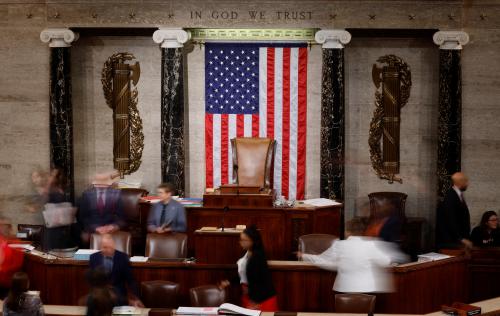This week, the House of Representatives ousted Kevin McCarthy as Speaker of the House, a position he had held since January. The final vote was 216 to 210, with eight Republicans joining all voting Democrats and passing a motion to vacate, introduced by Florida Representative Matt Gaetz. Sarah Binder, senior fellow in Governance Studies at Brookings, joins the show to discuss what happened and what it means for governance in Congress.
TRANSCRIPT
[music]
DEWS: You’re listening to The Current, part of the Brookings Podcast Network. I’m Fred Dews.
This week, the House of Representatives ousted Kevin McCarthy from his position as Speaker of the House, which he had held since January. The final vote was 216 to 210, with eight Republicans joining all voting Democrats and passing a motion to vacate, introduced by Florida Representative Matt Gaetz.
To discuss what happened and what it means for governance in Congress. I’m joined by Sarah Binder, a senior fellow in governance studies here at Brookings and a professor of political science at George Washington University. Sarah, welcome to The Current.
BINDER: Hi, thanks for having me.
DEWS: Kind of exciting times in Washington, D.C. and you’ve watched and analyzed Congress for a long time. What’s your reaction to what happened?
BINDER: Well, we don’t always like to admit this, but some of us were caught by surprise. We’ve been having our eyes on the difficulties. Speaker McCarthy had leading his majority party in the House. He managed to dodge a bullet by actually keeping the government open, by putting a bill on the floor that Democrats would support to carry it over the line.
But the faction that was after him, a very small faction of the Republican conference, was just infuriated and they went after him. And Democrats did not bail out the Speaker, leading to yesterday’s historic, first time ever the House has by vote deposed its own Speaker.
DEWS: I want to get to that point of the Democrats’ role in this event. But backing up a little bit, maybe even to January. Has it always been the case that one member of the House could file a motion to vacate the chair or to file a motion to get rid of the Speaker of the House?
BINDER: Well, that is a very longstanding procedure in the House. Interestingly enough, there’s a manual we call Jefferson’s manual for Thomas Jefferson, who had collected all these rules and used it when he was presiding in the Senate. And that’s part of House rules. So that procedure for a House to decide we need a new leader that’s baked in the rules.
What’s different here is Nancy Pelosi, when she became Speaker in 2019, she thought twice about that rule and she raised the threshold. She basically had the House change the rules so that the only one who could introduce this motion as a point of privilege, meaning make it straight to the floor for consideration, the Pelosi rule said you have to be the leader of the majority party or the minority party sent by your party to take out the Speaker.
When McCarthy came in as one of his many, many concessions to his far right in 2023, that was one demand of the far right, of the hard liners, said you have to lower that threshold back so that any single member like Matt Gaetz yesterday, any single member can go and seek recognition to offer that motion to vacate the speakership.
DEWS: So the Speaker of the House, it’s a constitutional office. So this is a really big deal, is it not? And kind of corollary to that, how does this affect the line of presidential succession?
BINDER: I mean, that’s what’s unique here about House leadership. Certainly compared to the Senate. Right? The leader of the House is written into the Constitution as the leader of the House. And so the consequences here are certainly we can come to the difficulties of legislating and governing on the House side.
But also, as you pointed out, the line of presidential succession. Congress under the Constitution can write laws to figure out the details of blow the president in the vice president. And in 1947, they wrote an act. They said if the vice presidency is vacant and there is no vice president to take the presidential position, it goes to the Speaker of the House.
But the law says if the speakership at the Office of the Speaker is vacant, which is what we have today, there’s no duly elected Speaker. Then it goes straight to the Senate. And it’s the position the president of the Senate. And you get to be that position not because you’re elected by the senators, not even elected by your own party, but because you’re the longest serving member of the majority party. So if there were to be a catastrophe, line of succession would go straight to Senator Patty Murray skipping over the House.
DEWS: We have now a Speaker or an acting Speaker in Representative Patrick McHenry of North Carolina. What are the powers that he has, if any?
BINDER: Well, there’s quite a bit of disagreement, ambiguity about the precise limits on, we’ll call him the Speaker pro tem, McHenry. So first, keep in mind, this is a new procedure. It was created in 2003. It was written into the rules in the wake of 9/11 out of concerns that another mass catastrophe with casualties on the Capitol or elsewhere could wipe out and remove the actual speaker. So we haven’t had one of those catastrophes. But what we do have is this process, and then we can get to what we know about the powers of this of McHenry.
So first, what’s the process? How did it get to be McHenry? Well, the new rule requires the Speaker McCarthy, back in January, make up a list, a secret list, because you and I and no Member, unless somebody leaked knew who was on the list. Number one in that listing was his loyal ally, Patrick McHenry, who was a committee chair but not actually a member of the leadership. So Patrick Henry is in this position.
And the rule basically says that this special Speaker pro tem will serve until a new Speaker is elected or a new pro tem Speaker is elected, and he exercises all of the authorities rights and responsibilities and authorities of the Office of the Speaker to the end of electing a new Speaker. That’s how smart parliamentarians in the Parliamentarian’s Office, it appears, are interpreting that rule.
However, I think other smart parliamentary minds outside the offices on the Hill wonder about the ambiguity there because look, what did temporary Speaker McHenry do yesterday? Well, the first thing he did was he slammed that gavel down and it put the House in recess—
DEWS: —and then they booted Nancy Pelosi out of her office—
BINDER: —her office, and then he booted Steny Hoyer out of his hideaway in the Capitol. Are all those actions toward the end of electing a new Speaker? I don’t know.
I think the key point here is if a speakership election happens and agrees to a Speaker quickly next week, we’ll have this new precedent that acting Speakers don’t have that many powers. You could imagine if drags on or there’s some difficulties, you might imagine that McHenry might want to exercise more powers.
At the end of the day, a majority decides how to interpret and apply its rules. But this is the very first time. And so there will be some precedent set here of how we expect the acting Speaker to use those powers of the speakership.
DEWS: The amateur historian mind in me travels back to 1841 when he knew Harrison died. The first president to die in office and John Tyler takes over and nobody was sure whether John Tyler was really the full president or maybe he was the acting president, something like that.
BINDER: What I think is interesting is to keep in mind the origins of this temporary speakership, which was in the wake of 9/11. Right? Those concerns about continuity of government when you didn’t know whether electing a Speaker could happen that week, the next week. Right?
And so the danger here is that McHenry follows very limited, a very limited model here of what his powers are, for good or for worse. But institutionally, we might want to have a pattern where in a real catastrophe, there is an empowered Speaker and an empowered majority party, of course, that sets the schedule. Right? So we’ll see what happens here. And it may be that things proceed apace with the election of the Speaker next week, even on a couple of ballots. And then we’re back, back, or our eyes focused on an actual Speaker.
DEWS: I want to circle back to what happens next in just a moment. But first, one other question a lot of people are talking about is the fact that the Democratic caucus could have helped McCarthy out. I think if only four Democrats had voted against the motion to vacate, then McCarthy would have kept his gavel and we would have, we would have proceeded. So what do you say to that proposition, that maybe just some Democrats should have peeled off for the sake of good governance or something?
BINDER: It’s it’s such a great question. And I think there was one of the reasons I was surprised that McCarthy actually lost on this vote was I expected Democrats, probably at least enough of them, not to vote. And then they don’t count. But they didn’t. They moved in lockstep.
And there’s a lot of dispute and debate about whether that was in their short term interests, their long term interests. Meaning will there be a Speaker who is, at the end of the day willing to make sure the government doesn’t shut down and so forth?
So people were surprised. I would say, first of all, it reminds us and I think we often lose sight of this, it reminds us of the power of the minority party in the House who really have so few procedural powers. But if they stick together in a slim majority, they can have quite a lot of power. Certainly that was the case in keeping the government open last week and in this case, really powerful by knocking off the Speaker.
What were they thinking? A little hard to tell. Certainly there’s no trust between McCarthy and the Democrats. And that certainly goes back to January sixth. And essentially McCarthy’s leadership of the Republicans and his blocking of all of a serious investigation by a bipartisan commission and so forth. But more generally, no love lost between Democrats and McCarthy. They must have been gambling that they could not be worse off with somebody else.
DEWS: So returning to what happens next, which you mentioned a little bit earlier. Already Kevin McCarthy has announced that he’s not going to stand for Speaker. Some other members of the GOP conference have said they will. So what are you looking for? What happens next?
BINDER: Well, with the caveat that in some ways we’re on untested grounds. Granted, we’ve had Speaker elections all the time, but it’s been at the beginning of the Congress. So there is some flexibility here for the majority to determine how it’s going to run. The Speaker election, it seems they’ve decided there will be a roll call vote as opposed to a recorded vote on the machines like they could do.
It seems that they’re giving time for each of the party caucuses, so the Republican conference, to essentially hear from prospective nominees next week. And then my hunch is they will nominate somebody. I think Democrats will nominate someone. And then so to an actual choice on the on the floor. But even that is not quite clear to me yet.
But essentially what we’re what we’re about to witness is this jockeying amongst Republicans to figure out, is there anybody who, in fact, can lock up that speakership vote.
DEWS: So thinking really big picture now, Sarah, kind of what does this mean for both the GOP and the House and Congress moving forward? I mean, you have a very thin Republican majority in the House. You have at least eight people who voted to vacate Speaker McCarthy’s position. And I’ve seen some reporting that a lot of Republicans are very mad at that group of eight, but then some Republicans are also mad at Democrats for not supporting Speaker McCarthy. So what is your assessment of kind of where this is all going for the next really year-and-a-half that this Congress will be seated?
BINDER: So it’s a, it’s a it’s a great question. And I think I guess a couple we can keep going up levels of levels of levels of abstraction here. So first and foremost is just the reminder of the difficulties of governance within the Republican Party. Certainly on the congressional side and certainly on the House side in particular, this is a party that for we might even say 30 plus years, all the way back to Newt Gingrich when he starts throwing bombs from the minority side against his own leaders, there have been bomb throwers in the Republican Party in the House. And they’re taking out their own leaders, which is, I think as well, undermine the number and the readiness of other Republicans to step up and want to be in the leadership.
I think even someone like Patrick McHenry a few years ago, everybody expected him to be a natural to go into the House leadership, but he wanted nothing with it. Didn’t want to go near it. And now, of course, he’s the acting Speaker.
So first and foremost, there are difficulties of governance within the Republican Party. And many, of course, doubt that many of those Republicans want to legislate. Certainly, the hardliners wouldn’t take yes for an answer in repeatedly rejecting proposals that McCarthy was sending their way.
Second, what does it mean more broadly for the House here? And in January, in the speakership race in the contested outcome, everybody was asking what’s the implications of the contested race for the Speaker here. But the contested race was a reflection of this turmoil in the Republican Party in the first place. And so we have to ask the same question. Like, is this disruption in the middle of this Congress, is that going to make things any worse than they already were? Or are we just seeing the outgrowth of this factionalized Republicans?
And I think the the answer here is somewhere in between. This was never going to be a smoothly running House. It was never going to be smoothly running split party Congress. And we’ve seen that already by coming so perilously close to a government shutdown.
There’s more of that, there’s more of that drama and there’s more of that conflict along the way. And, of course, the stakes will just be even steeper when you get closer to January 1st.
Lucky for all of us and for the country, they have already raised the debt ceiling. And so that takes a potential target off the table for the hardliners. But I don’t think we’re any closer to knowing how the two parties and chambers and branches are going to sort of overcome their differences here, which they thought had been settled by agreeing to the big budget deal on raising the debt ceiling.
DEWS: Well, Sarah, this has been, as always, a fascinating conversation. I appreciate your time and helping us understand what’s going on in the House of Representatives.
BINDER: Sure. Thanks for the awesome questions.
[music]






Commentary
PodcastWhat Kevin McCarthy’s ouster as Speaker of the House means for governance
October 4, 2023